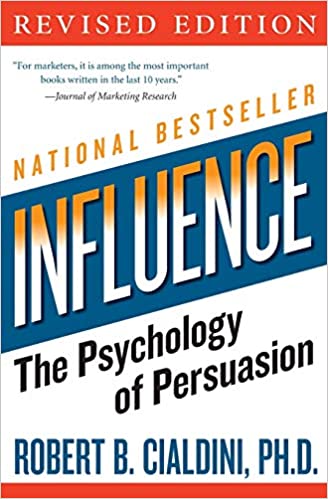Robert B. Cialdini – Influence Audiobook
Robert B. Cialdini – Influence Audiobook (The Psychology of Persuasion Revised Edition)

Influence Audiobook
As a marketer, I am always on the lookout for the best marketing publications. This book It is a game-changer.
I have a response to the celebrity evaluations of only one… The uncharitable assessments have stated that the entire contents of the book It could have been written in just a few pages. This would appear to be real at first glance, I agree. Influence Audiobook Free. Harvard Company Review article, “Taking advantage of Science of Persuasion”. CialdiniThis is an example taken from their October 2001 issue. You can also get the 6 Principles of Guides Tabulation… it’s a time-saver!
Sales concepts must be presented, not just described. You must give examples.
We need to see the proof. You also need the whole book To do this. Individuals who have read the article may also check out the website.
Ideas are great, but nothing else happens. The material transforms salesmen bookAs with all sales publications, this is a must-have. Salespeople can benefit from a sales publication. bookThe concepts must be discussed, validated, proved, accepted and made practical. This publication does just that.
I may have as many as 2,000 books Marketing. This publication is definitely in the top 5. This is an enthralling, yet frightening read. Dr. Cialdini details six principles of persuasion, (together with reciprocity, commitment/consistency, authority, taste, and deficiency as well as social proof, which is basically groupthink. It allows us to compare our behavior with others.
One of the most terrifying parts of the book Here is information about Chinese indoctrination.
Many American soldiers captured during the Oriental War ended up in prison.-Of-Chinese communists manage war (POW), camps. Early in the problem, it became apparent that the Chinese treated slaves differently to their North Korean allies. The Chinese preferred brutality and severe penalties to conformity. The Red Chinese engaged in what they called their “Lenient Plan,” a coordinated and advanced emotional attack on their captives. American psychologists conducted intensive interviews with the returned prisoners after the battle to discover what had happened. Due to the unsettling success of certain elements of the Chinese program, the intensive emotional examination was necessary. The Chinese, for example, were very reliable at getting Americans to share information with each other. This was in stark contrast to the behavior of American POWs during World War II. This is why escape plans were quickly revealed and the retreat attempts also failed. Dr. Edgar Schein, the principal American investigator into the Chinese indoctrination program, stated that “when an escape did occur”, “the Chinese usually recouped him conveniently by offering a bag full of rice to anyone who transformed him in.” It is claimed that almost all American detainees at the Chinese camps had actually collaborated in some way with the enemy.
A study of the Chinese prison-Camp program shows that camp employees relied heavily on uniformity stress and commitment to get the desired conformity from detainees. These Chinese faced the problem of how to gain any type or partnership with the Americans. These males were taught to identify themselves by their rank and serial numbers. What is the best way for captors to get such males to turn in other detainees or to openly knock on their country without physical violence? Robert B. Cialdini – Influence Audio Book Download. The Chinese answer was simple: Start small and build.
For example, prisoners were frequently asked to make gentle anti-Semitic statements.-American or pro-Communist to make it seem irrelevant (“The United States does not excel” “In a Communist nation, joblessness is not a problem .”). After these small demands were met, men were forced to comply with more important and substantive questions. If a male had already agreed with his Chinese interrogator that America is imperfect, he might be asked to give examples of how he thought this was true. After he had discussed this with his Chinese interrogator, he could be asked to create a list of “issues” with America and to sign it. Later, he may be asked to review his list in a discussion with other detainees. “But, it’s what it is that you really think, not it?” Later, he might be asked to write an essay expanding upon his list of topics and discussing these issues in greater detail.
In an anti-Christmas campaign, the Chinese could use his name and essay.-The broadcast was transmitted by American radio to the entire camp as well as to other POW camps in North Korea and to American forces in South Korea. All of a sudden he would realize he was a “collaborator”, having actually provided assistance to the enemy.
